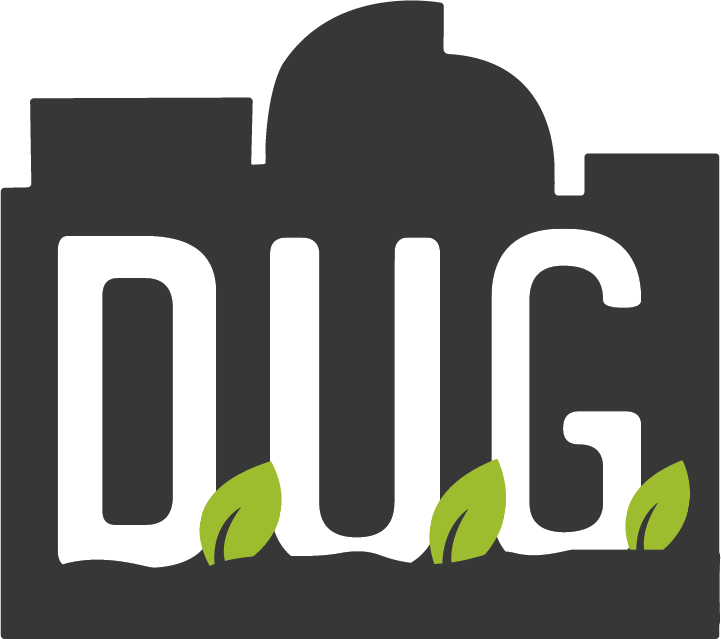Applications for new food forests open Summer 2025
‘Food forests’ are one of the most ancient forms of land stewardship, and we are expanding the idea of what an urban garden can be by planting food forests across metro Denver.
DUG’s Etkin Family Foundation Food Forest Program was launched in the spring of 2022 with the goal of planting accessible food forests in small, underutilized areas in public spaces and community gardens. In 2023, the program expanded to 20 food forests.
DUG is currently seeking public or privately-held land for future sites. Learn more about the criteria for site selection.
By combining trees, shrubs, perennials, and some annuals, DUG food forest sites mimic the resilience and productivity of a natural forest. Different sizes and ecological niches allow a wide diversity of plants to thrive together while yielding food, medicine, and habitat–and that diversity reduces the need for maintenance over time.
For thousands of years, cultures around the world have designed their own unique food forests based on the needs and opportunities of their region.
We aim to do the same and create public-access, shady oases planted with water-conscious dryland techniques and built to thrive in a changing climate and feed the community at the same time.
In a well-designed food forest, plants fill various niches, both spatially and functionally. Some grow tall or hug the ground, contributing nutrients, attracting pollinators, or suppressing weeds. While some bear fruit or nuts and have medicinal properties, not all are edible or usable by humans. The provided example showcases plants coexisting harmoniously in a DUG food forest.
How to use this space
This is a place for food, exploration, education, and community. Explore, identify plants, learn about unfamiliar ones. Observe interactions among plants, insects, animals, and the environment, considering replicating such systems in your surroundings. Enjoy the space by picking ripe fruit to share with yourself or neighbors—it’s here for everyone’s enjoyment.
Harvesting
Take only what is ripe–it tastes better and won’t risk damaging the plant if you pick when the fruit is ready. If you’re not sure if a fruit is ripe, check the signage or look for indicators placed by Tree Keepers. Take only what you need or can share–many people use this space, and it’s important that we preserve it for others. If it looks like fruit is going to waste, let someone know so we can distribute it!
Who takes care of this space?
This space is managed by volunteer Tree Keepers, who keep the plants watered, pruned, and maintained in order to produce the best experience for visitors.
Pets
We love to have pets getting fresh air and exercise near our spaces, but please keep them on the outside edges of the food forest and remove their waste if they make any. This ensures that all of the food stays safe to eat.
New plantings
Keep an eye out for any new plants; they’re always being added to the food forest and are especially vulnerable to damage in the first year. They should have some kind of marking, but please step carefully as you explore.
Before you eat…
Not everything in the food forest is edible! Some plants are only for beauty or wildlife habitat, and there will always be plants and mushrooms that grow here without the knowledge of DUG or the Tree Keepers. Please be certain about your identification before you eat anything. Look to the signage or our website for more information.
This initiative was made possible through initial seed funding from The Giving Grove and The Marcus Foundation as well as a transformational gift from the Etkin Family Foundation.
What’s in our Food Forests
24
479
135
624
Benefits of Urban Food Forests:
-
Stimulates community vitality through community-based cultivation of fresh fruits, nuts, and berries – a natural extension of the tried and true community garden model
-
Conserves resources and helps restore healthy ecosystems by capturing carbon, producing oxygen, enriching soil, and diversifying habitats
-
Enhances food access by making free, healthy fruits, nuts & berries available for ALL, especially urban-dwelling kids and adults who might not have access to green spaces or fresh, affordable produce
-
Promotes food sovereignty by giving people the land, resources and knowledge to grow their own
-
Provides widely documented mental health benefits associated with spending time in nature – reduces isolation, anxiety, depression etc.
-
Replace parasitic sod and grasses, ensuring our precious water is used wisely
-
Re-introduces heirloom and native species, helping Denver transition to climate-appropriate plants and trees
-
Attracts pollinators with biodiverse and climate-appropriate greens spaces, bolstering all life in the city
-
Reduces the heat island effect by helping to grow the urban canopy
-
Contributes to Denver’s compost system with discarded/past-date produce, providing the city with soil enriching inputs
Get Involved
Food Forestry Training Program
is a 15-session, hands-on and classroom-based, training course in designing, planting, and maintaining edible forest gardens in the urban setting.
Become a Tree Keeper
The role doesn’t require any previous experience with taking care of trees; you will be trained in pruning, pest management, and general tree health.
Volunteer with Us
Want to help out at one of our food forests? You can explore volunteer workdays here – just search for the “GREEN APPLE” icon for volunteer opportunities at a food forest.



